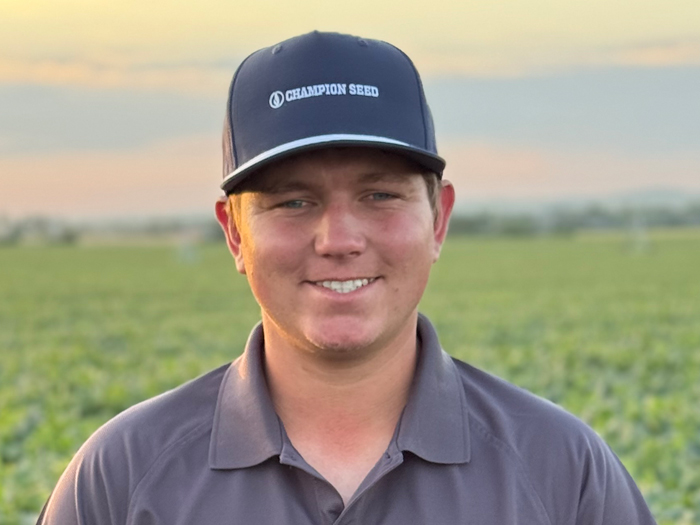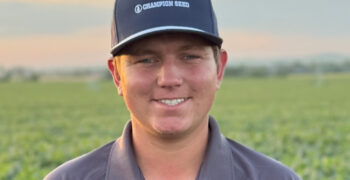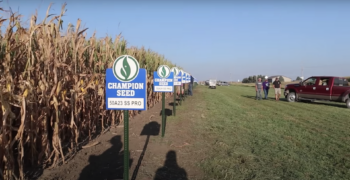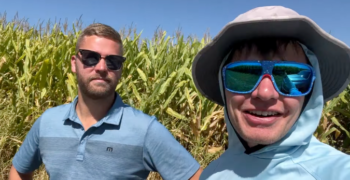Logan Schaffert is continuing his dad’s 40-year legacy of farming in Trenton, Nebraska. The family farm is located in the Southwest corner of the state, about 50 miles from the Colorado state line and 10 miles from the Kansas border. Logan raises both dryland and irrigated corn as well as wheat. Approximately 25% of his corn crop is irrigated and a portion of it is used as livestock feed.
“Our dryland corn we plant back to wheat if we think we have adequate moisture,” said Schaffert.
Lack of moisture is the biggest challenge faced by farmers in Hitchcock County. Pests are not much of an issue.
“Sometimes we have Western bean cutworm or some beetles, but the climate is typically too dry for them,” said Schaffert. “The biggest challenge is getting adequate moisture and timely rains. It’s just always hot and dry here. It’s not humid. Late July and August are very dry for us. We are lucky to get a rain in that timeframe. Harvest typically starts around September 5 for dryland corn, with the corn being at about 16% moisture.
Personalized support produces results
“It is a lot harder to grow corn out here than in Central Nebraska. We don’t have as good of soil. We might be lucky to raise 120 bushels an acre of dryland corn.” Schaffert said successful farming in this environment relies on the best local agronomic advice.
That’s where Champion Seed representative Seth McClure came in. Schaffert met McClure while attending Husker Harvest Days and they formed a partnership. That initial encounter with Seth and the advice he and the Champion team provided led to him becoming a Champion dealer. The Schaffert farm slowly transitioned to Champion Seed corn.
“I deal directly with the people at Champion Seed. Working with a smaller company, if you have a complaint or a concern, you can contact the agronomist directly. With a big company, you may never reach the person who needs to know what is going on. Champion Seed is easy to work with, and they understand the conditions.
The soil conditions change quite a bit from place to place on the farm. Some spots are really sandy and some spots have nice soil. “I encounter very sandy soils and I’ve found a lot of varieties that shine,” said Schaffert.
“We started finding a lot of varieties that we really liked. They outyielded what we had been planting. We had about a 10% yield increase.”
The Champions of Schaffert’s fields
For the irrigated corn, Logan used the Champion 63B24 PowerCore hybrid in 2024. “We are trying 68A25 [in 2025] and it looks phenomenal. I planted it in soil that is not that great and that field looks well.”
On the dryland, Logan continues to identify Champion Seed hybrids that excel in regional conditions. “If it rains, it will yield a little more than expected. If it doesn’t rain, it still holds on. It stays green longer than most competitors that we have used. However, what matters is what is in the tank at the end of the day.”
Local agronomic advice rooted in results
Schaffert knows farmers typically select seeds based on peer feedback. This puts a lot of weight on the local agronomic advice he provides. Like many other Champion dealers, Schaffert vets seeds before he recommends them to local farmers.
“I plant it on my own farm for three years prior to selling it,” said Schaffert. “I don’t want to sell it to a customer and have it fall on its face. I do test plots, and if there is a number that worked well the first year, I will plant it large scale in a few different fields. If it doesn’t do well on a large scale, I don’t continue with it,” he added.
This proven performance helps eliminate guesswork for Schaffert’s customers when it’s time to select the right seed for their acres. “If the customer wants to try something, I let them try it, but I inform them that I don’t know a lot about this variety,” said Schaffert.
Champion Seed provides the seed and support farmers in Hitchcock County need, and it’s backed by the local agronomic advice Schaffert brings to the table. Because there is no one-size-fits-all approach to seed selection.



